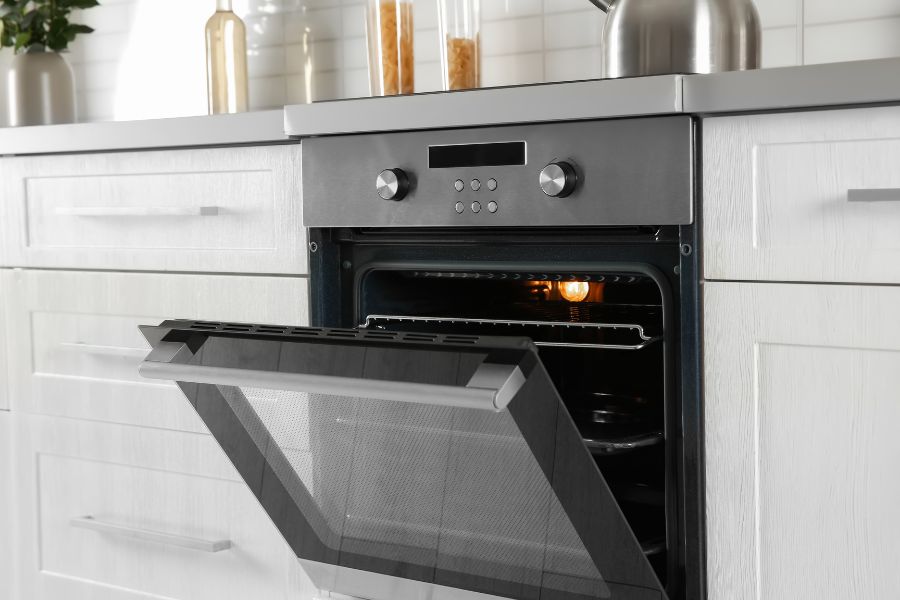At a time we’re all looking to save a bit of cash, one of the first areas we look at is saving on energy bills. In reality, that’s easier said than done.
In this guide we’ll be looking at if gas is cheaper than electricity, the difference in cost, how effective it can be around the home and what changes you can make that things a little greener when it comes to gas vs electricity.
Gas vs electric: what’s the difference?
Spoiler alert! You probably already know the answer.
It may seem obvious, but when it comes to heating your home and running your appliances it’s important to know what does what.
Not all UK homes have a gas supply, but those that do use a boiler to burn the fuel to heat up water. This water is then transferred to pipes and radiators to give you hot water and heating around your house.
Electricity is available in just about every home in the UK. Due to its versatility, electricity is used to power pretty much everything in your home. Of course it can deliver warmth using devices such as storage or electric heaters, but it also powers anything from a kettle to a TV.
Is gas heating cheaper than electric?

Looking at this at face value, gas is a lot cheaper than electricity. But it’s fair to say that they both have their pros and cons.
As of October 1 2023, the Energy Price Cap changed, which affects the rates that you pay for gas and electricity.
The charges will be as follows:
| New Energy Price Cap: Rates from 1 October to 31 December 2023 |
|
|---|---|
| Gas | Unit rate: 6.89p per kilowatt hour (kWh) Standing charge: 29.62p per day |
| Electricity | Unit rate: 27.35p per kWh Standing charge: 53.37p per day |
It’s worth mentioning that these prices are only in place up until 31 December 2023, so as we’ve seen over recent years, these prices are subject to change.
While these charges will see an obvious change in your costs, there are also other factors for you to consider. For example, when it comes to gas boilers there is a clear price difference, although this doesn’t mean that your bills will be that much cheaper.
Electric systems have the option of installing an Economy 7 or Economy 10 meter, which means that you can cut the cost of electricity for seven or 10 hours during off-peak hours to help with costs. Where this isn’t an option for gas.
That’s not to say that one is better than the other. It simply means that when you’re thinking about which system you should install in your home, there’s a few things to consider. To help you, we’ve put together a blog which looks at gas vs electric boilers.
Pros and cons of using electric heating
To give you some idea, we’ve put together this handy list of pros and cons of gas and electric heaters.
5 pros of electric heating
- Electric heaters have a number of options, these range from storage heaters to air source heat pumps or small electric heaters.
- They give off no carbon dioxide
- Low maintenance costs
- If you’ve had an extension or room conversion, air conditioning electric systems can effectively heat a single room
- Depending on when you use it, energy tariffs such as Economy 7 or Economy 10 could see you paying less for your electricity.
5 cons of electric heating
- Unit prices for electricity are more expensive than gas
- Systems such as air source heat pumps are more expensive to install
- Storage heaters that are installed before 2018 are inefficient in comparison to new models and other alternatives
- Basic storage heaters can waste a lot of energy and in some cases overheat rooms
- Some older storage heaters may contain asbestos. If you’re concerned that you own a storage heater with asbestos you can contact the Asbestos information Centre who have a list of storage heaters that contain asbestos.
Pros and cons of gas heating
3 advantages of gas heating
- Cheaper way to run your heating
- Modern, A-Rated boilers are over 90% energy efficient
- Innovative controls such as smart thermostats give you more control of heating around your home.
3 disadvantages of gas heating
- Gas boilers burn fuel which contributes to global warming and climate change
- Under current government regulations, gas and oil boilers will be banned in new build homes from 2035 (properties built before 2035 can still install gas boilers).
- Gas boilers require a yearly boiler service
Is it cheaper to cook with gas or electric?

On the face of it, gas ovens are much cheaper to run compared to electric ovens, as at the time of writing the unit price for gas is cheaper. For example, an A-rated 68 litre gas oven would cost around 17p per use and the equivalent electric oven would cost around 25p.*
However, using electrical appliances such as microwaves or air fryers can be much more time and energy efficient for cooking.
If you have an electric oven, a good tip is to make use of the internal fan as it means you won’t need your oven at such a high temperature, which can save you money.
Another great tip is to batch cook your food and freeze it, again this means that you’re using less energy.
It’s also cheaper and more speedy to use an electric induction hob, they’re easier to clean too.
Is it cheaper to boil water with gas or electric?

When it comes to making a brew nearly every single one of us would automatically flick the switch on the kettle and let it do its thing. But you may be surprised to know that it’s actually cheaper to boil your water on the gas hob!
In an experiment that looked at the differences between the two, gas was a cheaper option. But as you’ll see on the table below, water takes a lot longer to boil on a gas hob vs the electric kettle. So, in reality we’re paying for the convenience that comes with electricity over gas.
Gas vs electricity: Boiling water experiment
This experiment looked at the comparison between boiling one cup of water on a gas hob vs an electric kettle.
| Gas hob | Electric kettle | |
|---|---|---|
| kW of heating source | 1kW | 3kW |
| Time to boil water | 5 minutes | 1 minute |
| kWh used | 10p/kWh (gas) | 0.05kWh (3kW * 1 minute / 60 minutes) |
| Energy cost by source | 0.8p | 36p/kWh (electric) |
| Cost to boil all the water | 0.8p | 1.8p |
| Cost per cup of tea | 0.8p | 1.8p |
Is gas or electricity better for the environment?
As our understanding of the impact that gas has on climate change and global warming, greener options are becoming more popular. As we mentioned above, the government has plans in place that will see a ban on the installation of gas boilers in newly built homes from 2035.
Because of this initiative, it’s thought that heat pumps are the future when it comes to green heating. Powered by electricity, heat pumps gather up the warmth from the air or ground to heat the inside of your home as well as your water.
You may also know about biomass boilers. Biomass boilers heat the home and water using wood pellets, chips or logs instead of gas.
You can currently get grants of up to £7,500 from the government for those who are looking to replace their old gas boiler with a heat pump or biomass boiler.
While these are without doubt a greener option, it’s important to remember that systems such as this are only capable of working to their full potential when they’re paired with the right insulation throughout the home. By doing this you’ll save money long-term, but the initial cost can be expensive.
Understandably, this may not be an option for us all. But to help you do your bit, you can take a look at our energy-saving tips, which will give you some great ideas on how you can be a little more environmentally friendly, and maybe save a bit of money.
You may also be interested in looking at how you use your electricity and understanding electricity usage to see where you can improve how and what you spend your money on.
Keep your heating running efficiently all year round
In essence, there are energy and monetary advantages and disadvantages to both gas and electricity. The reasons to choose one or the other usually comes down to convenience rather than the actual cost. Obviously, there are greener options and there are a number of ways we can all reduce our energy use to ensure we are doing our bit for the planet.
One way of keeping on top of your boiler’s efficiency and maintenance is to look at boiler cover options. Taking out cover could save you being out of pocket, should something happen at home.
You may also be interested in our one-off repair service that you can call upon whenever you need us. Either way, we’ve got you covered.
*Energy price units correct at time of writing and are subject to change




